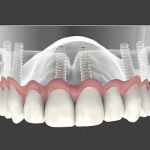Can a Dentist Prescribe Painkillers for Tooth Pain?
If you've ever experienced a toothache, you know just how unbearable the pain can be. It can disrupt your entire day and make even the simplest tasks feel impossible. One question that often arises when seeking relief is whether or not a dentist can prescribe painkillers. As a patient myself, I've wondered this too, and I wanted to dive deeper into the topic to share some insights with you.
1. The Role of Dentists in Pain Management
Dentists are healthcare professionals who specialize in oral health, including diagnosing and treating tooth pain. When it comes to pain management, they are equipped to provide relief for many common dental issues, from cavities to gum disease and post-surgical recovery. Pain after a dental procedure, such as a tooth extraction or root canal, is not uncommon, and that's where pain management becomes crucial.
Having had a tooth extraction myself last year, I can personally vouch for how helpful it is to have a dentist prescribe painkillers. After the procedure, I was prescribed a combination of nonsteroidal anti-inflammatory drugs (NSAIDs) and, in some cases, stronger medications like opioids, if the pain was severe. While these prescriptions can offer relief, it's important to understand how and when dentists prescribe them.
2. Types of Painkillers Dentists Can Prescribe
Dentists can prescribe a variety of painkillers based on the severity of the pain and the specific dental issue you're dealing with. Most commonly, pain relief after dental procedures is achieved with over-the-counter medications, but for more serious discomfort, dentists can prescribe stronger medications. Here are the most common types of painkillers a dentist might prescribe:
- NSAIDs (Nonsteroidal Anti-Inflammatory Drugs): These are the most common painkillers prescribed by dentists for mild to moderate tooth pain. Medications like ibuprofen or naproxen help reduce inflammation and alleviate pain.
- Acetaminophen: Often prescribed for pain relief, acetaminophen can be used alone or in combination with other medications. It is an effective pain reliever but doesn't have the anti-inflammatory properties of NSAIDs.
- Opioids: In cases of severe pain, such as after major oral surgery, a dentist might prescribe opioids like hydrocodone or oxycodone. These are stronger painkillers and are typically prescribed only for short-term use due to their potential for addiction and side effects.
In my own experience, when I had a tooth extraction, the dentist prescribed me a combination of ibuprofen and acetaminophen to control the pain. Thankfully, this combination was enough to keep me comfortable without the need for opioids. However, if your pain is more severe, your dentist might discuss the option of stronger pain medication with you.
3. How Dentists Determine What to Prescribe
When deciding what type of painkiller to prescribe, a dentist considers several factors, including the nature of the dental procedure, the severity of the pain, and your medical history. If you're someone who has a history of kidney disease or stomach ulcers, for example, your dentist may choose a medication with fewer side effects that won’t aggravate existing conditions.
Before I had my tooth extraction, my dentist asked me about any allergies and my current medications. This is standard practice to ensure that the prescribed painkiller won’t interact negatively with other drugs I might be taking. They also inquired about my previous experience with painkillers to ensure I wouldn’t have an adverse reaction to the prescription.
4. When Should You Contact Your Dentist for Pain Management?
While some mild toothaches can be relieved with over-the-counter medications, there are instances when you should definitely contact your dentist for help. If you have persistent or severe pain after a dental procedure, it's essential to reach out to your dentist as soon as possible. Prolonged pain could be a sign of an infection or other complications that need professional attention.
For example, after my extraction, I initially felt some discomfort, which was expected. However, when the pain became more intense and the swelling didn't go down after a few days, I called my dentist. They were able to adjust my pain management plan and prescribed a stronger medication to get me through the healing process.
5. Over-the-Counter vs. Prescription Painkillers: What’s the Difference?
It’s important to understand the difference between over-the-counter (OTC) painkillers and prescription painkillers. OTC medications like ibuprofen and acetaminophen are available without a prescription and can help alleviate mild to moderate pain. However, prescription painkillers, such as opioids, are typically reserved for more intense pain and should be used with caution due to the risk of addiction and other side effects.
During my recovery, I found that the OTC painkillers worked well in the beginning, but there were days when the pain became too intense. At that point, my dentist recommended an opioid for a short period of time to manage the pain, ensuring I could get enough rest for my body to heal properly.
6. Safety Considerations with Painkillers
When prescribed painkillers, it's crucial to follow your dentist’s instructions carefully. Overuse or misuse of pain medications can lead to serious health issues. With opioid medications, there is a heightened risk of dependence, which is why they are generally only prescribed for short-term use. Always take the medication as directed, and never exceed the prescribed dosage. If you experience any side effects or have concerns, don’t hesitate to contact your dentist.
During my recovery, my dentist emphasized that I should take the prescribed medications only as needed and not to exceed the recommended dosage. They also informed me about the potential side effects of opioids and made sure I understood how to safely taper off the medication as my pain subsided.
Conclusion: Managing Tooth Pain with the Right Prescription
While it may seem like a simple question—can dentists prescribe painkillers?—there’s a lot more to it than meets the eye. Dentists are equipped to handle many forms of dental pain and are trained to provide effective pain relief. From over-the-counter painkillers to stronger prescription medications, dentists tailor pain management plans to ensure that their patients are as comfortable as possible during recovery.
Remember, if you're dealing with significant tooth pain or need help managing discomfort after a dental procedure, don’t hesitate to reach out to your dentist. They are there to help guide you through the process and ensure you receive the care you need.







 Brace Busters3.0 (2 review)
Brace Busters3.0 (2 review) Dr. Samantha L. Cho, DDS5.0 (3 review)
Dr. Samantha L. Cho, DDS5.0 (3 review) Feil Orthodontics4.0 (76 review)
Feil Orthodontics4.0 (76 review) Kid's Choice Dental - Federal Way4.0 (790 review)
Kid's Choice Dental - Federal Way4.0 (790 review) Metro Dentalcare Osseo4.0 (414 review)
Metro Dentalcare Osseo4.0 (414 review) Montclair Perio & Implant Specialists: Anne Hartnett, DDS0.0 (0 review)
Montclair Perio & Implant Specialists: Anne Hartnett, DDS0.0 (0 review) The Importance of Oral Health Education During Pregnancy for a Healthy Pregnancy
The Importance of Oral Health Education During Pregnancy for a Healthy Pregnancy Best Tips for Brushing Your Teeth Properly for Healthy Gums: Essential Techniques for Oral Health
Best Tips for Brushing Your Teeth Properly for Healthy Gums: Essential Techniques for Oral Health Why Skipping Dental Checkups Can Lead to Bigger Oral Health Problems
Why Skipping Dental Checkups Can Lead to Bigger Oral Health Problems Advantages of Porcelain Dental Restorations
Advantages of Porcelain Dental Restorations How Can Diabetes Cause Tooth and Gum Problems? Preventing and Managing Oral Health Issues
How Can Diabetes Cause Tooth and Gum Problems? Preventing and Managing Oral Health Issues Healthy Habits for Promoting Good Oral Health and Hygiene: Tips for a Healthy Smile
Healthy Habits for Promoting Good Oral Health and Hygiene: Tips for a Healthy Smile